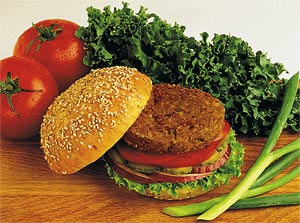
Protecting the Liver from Veggie Burgers
Protecting the Liver from Veggie Burgers
Protecting the Liver from Hepatitis C and Veggie Burgers Particularly valuable to those with Hepatitis C, a new investigation sheds light on the common misconception that veggie burgers are a liver-friendly food.
by Nicole Cutler, L.Ac.
For the estimated four to five million Americans living with chronic Hepatitis C, protecting their livers from damage is paramount to staying healthy. Assuming veggie burgers to be health food fare, many with Hepatitis C make this popular vegetarian item a dietary staple.
However, a non-profit organization that performs research and investigations on agricultural issues has found that some veggie burgers may not be all that. In fact, the Cornucopia Institute recently revealed that many veggie burgers are made with a toxin that is known to put an additional burden on the liver.
Hepatitis C is a virus that lurks in the bodies of a staggering number of people, slowly damaging the liver. While about half of those infected are lucky enough to successfully eliminate the virus from their body with the current standard treatment, a significant portion of those with Hepatitis C must wait for better, emerging treatments.
The liver is an amazing organ, responsible for countless functions that keep us alive. One of the liver’s primary responsibilities is to remove waste and toxins from the blood supply. Unfortunate for those with chronic Hepatitis C, a liver that has already sustained damage from the virus has a much harder time cleansing the blood. Thus, more toxins circulate throughout the body, a situation that puts many structures in jeopardy – including the liver.
Having a higher concentration of toxins in the blood is akin to a double whammy for the liver: With more toxins to process, there is a greater workload on the liver.The increased toxin exposure causes more liver cells to die – rendering them unable to function. Thus, individuals managing chronic Hepatitis C must make every effort to limit the amount of toxins their liver contends with.
A toxic chemical made from crude oil, hexane is used in the manufacture of some soy-based foods. In conventional food processing, soybeans are immersed in what the industry calls a “hexane bath” before they are further processed into ingredients such as oil, soy protein isolate or texturized soy protein – common ingredients in traditional veggie burgers.
Unfortunately, the liver bears the brunt of hexane’s burden, and can easily be damaged by high levels of hexane exposure. Veggie Burgers People managing Hepatitis C typically strive to avoid easily recognizable liver toxins like cigarette smoke, processed junk food and alcohol. However, most are totally unaware that some vegetarian food contains hazardous chemicals.
A recent investigation by the Cornucopia Institute found that many non-organic veggie burgers are made with hexane. In order to meet the demands of health-conscious consumers, manufacturers of soy-based fake meat like to make their products have as little fat as possible. The cheapest way to do this is by submerging soybeans in a bath of hexane to separate the oil from the protein.
According to Cornucopia Institute senior researcher Charlotte Vallaeys, “If a non-organic product contains a soy protein isolate, soy protein concentrate, or texturized vegetable protein, you can be pretty sure it was made using soy beans that were made with hexane. According to the Cornucopia Institute, popular veggie burgers made with hexane, include: .
However, most are totally unaware that some vegetarian food contains hazardous chemicals. A recent investigation by the Cornucopia Institute found that many non-organic veggie burgers are made with hexane. In order to meet the demands of health-conscious consumers, manufacturers of soy-based fake meat like to make their products have as little fat as possible.
The cheapest way to do this is by submerging soybeans in a bath of hexane to separate the oil from the protein. According to Cornucopia Institute senior researcher Charlotte Vallaeys, “If a non-organic product contains a soy protein isolate, soy protein concentrate, or texturized vegetable protein, you can be pretty sure it was made using soy beans that were made with hexane.”
According to the Cornucopia Institute, popular veggie burgers made with hexane, include:
· Amy’s Kitchen
· Boca Burger, conventional
· Franklin Farms
· Garden Burger
· It’s All Good Lightlife
· Morningstar Farms
· President’s Choice
· Taste Above
· Trader Joe’s
· Yves Veggie
Cuisine Veggie burgers that are hexane-free, include:
· Boca Burgers “Made with organic soy”
· Helen’s Kitchen · Morningstar “Made with organic”
· Superburgers by Turtle Island
· Tofurky
· Wildwood
The United States Department of Agriculture (USDA) organic standards strictly prohibit the use of hexane. While products labeled “organic” aren’t allowed to contain any hexane-derived ingredients, that rule doesn’t apply to foods that are labeled “made with organic ingredients.” There is no realistic way to avoid contact from all of the toxins lurking in today’s society. However, until everyone infected can be cured from Hepatitis C, those with the virus have extra motivation to minimize their toxin exposure.
Thanks to the Cornucopia Institute’s research, we know which veggie burgers contain hexane and which are hexane-free – knowledge that gives those with Hepatitis C greater control over the toxins gaining entrance into their bodies.
References:
http://peer.tamu.edu/curriculum_modules/cell_Biology/module_5/hazards2.htm, A Toxic Substance – Hexane, Retrieved April 14, 2010, Texas A & M University, 2010.
http://www.alternet.org/food/146439/which_veggie_burgers_were_made_with_a_neurotoxin, Which Veggie Burgers Were Made With a Neurotoxin?, Kiera Butler, Retrieved April 14, 2010, Mother Jones Online, April 2010.
http://www.cornucopia.org/soysurvey/OrganicSoyReport/behindthebean_color_final.pdf, Behind the Bean: The Heroes and Charlatans of the Natural and Organic Soy Foods Industry, Retrieved April 14, 2010, Retrieved April 14, 2010, Cornucopia Institute, 2010.
http://www.eco-usa.net/toxics/chemicals/hexane.shtml, Hexane, Michael Habeck, Retrieved April 14, 2010, Toxicological Profile for Hexane, July 1999, Agency for Toxic Substances and Disease Registry, Eco-USA, 2010.